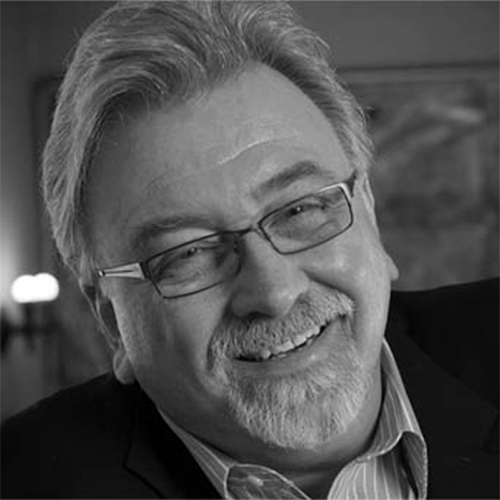
Dan Martin, Stanley and Marcia Gumberg Dean, College of Fine Arts
Dan Martin joined the Carnegie Mellon faculty in 1992 to direct the Master of Arts Management (MAM) Program. He founded the Center for Arts Management and Technology (AMT Lab's predecessor) and established the Master of Entertainment Industry Management (MEIM) Program. Immediately prior to his appointment as dean of Carnegie Mellon University's College of Fine Arts, he served as director of the Institute for the Management of Creative Enterprises (IMCE), a collaborative initiative of the College of Fine Arts and the H. John Heinz III College. Martin has consulted with cultural organizations in strategic planning, information technology, not-for-profit governance and finance management and has authored a number of reports, magazine articles and journal articles on arts management and related issues. Prior to joining the academic community in 1989, he spent 14 years in not-for-profit professional and educational theatre administration.
What books are currently on your nightstand?
"High Notes" by Gay Talese, and "Thank You for Being Late" by Thomas Friedman.
What’s the last great book you read?
A book that I re-read every five years or so since I first picked it up as a teenager in the 1960s: Joseph Heller's "Catch-22". The book continues to horrify, confuse, infuriate and inspire me.
What’s your favorite book no one else has heard of?
Hunter Thompson's "The Great Shark Hunt: Strange Tales from a Strange Time". A collection of the "gonzo" journalist's observations of American politics and culture during the 70s and 80s.
Which genres do you especially enjoy reading? And which do you avoid? I am drawn to novels about the American experience, including the books of John Irving, Thomas Berger and especially John Updike. Lately, I've been enjoying the crime fiction and suspense thrillers of Elmore Leonard. Being a child of the 1960s, I guess it would not be a surprise if I were to admit that I include Kurt Vonnegut's works as my favorites, even the weaker works he wrote late in this life. My guilty pleasure when I need pure escapism: John Grisham novels.
I’ve never been much of a fan of westerns, but I would include Larry McMurtry's "Lonesome Dove" as another one of my favorite books. I started the book four times and fell off about 50 pages into it, but I finally found my way into the meat of the novel and I became obsessed with it. The characters and their lives came to mean so much to me that I felt quite a loss – almost in mourning – when I finished the book.
What are the best books related to your topic of study?
"Management and the Arts" by William J. Byrnes, and "Creative Industries: Contracts between Art and Commerce" by Richard E. Caves.
How do you like to read? Paper or electronic? One book at a time or simultaneously? Morning or night? I only read books on paper. I made the leap (or the fall, depending on your point of view) to newspapers and magazines in digital format, but I require the tactile experience of an actual book in my hands – and only one book at a time.
How do you organize your books?
All of our fiction, poetry and children's books line the walls of our guest room – by category and in alphabetical order by author. My reference books, textbooks, biographies and other nonfiction books are in my home office, again organized by category and in alpha order. Current textbooks and other resources that I use for my research and coursework are in my campus office.
What book might people be surprised to find on your shelves?
A. A. Milne's various "Winnie the Pooh" books. I received a large collection of those stories and poems from a distant relative when I was quite young. I loved the world of Winnie the Pooh, Christopher Robin and all of their friends as a child. I can still rattle off many of the lines from some of the poems: "They’re changing the guard at Buckingham Palace. Christopher Robin went down with Alice. Alice is marrying one of the guards. 'A soldier's life is very hard,' says Alice."
What's the best book you ever received as a gift?
"Pictures at a Revolution: Five Movies and the Birth of the New Hollywood", by Mark Harris. The author looks at Hollywood in 1967 when the film industry was struggling for traction and meaning after years of cookie-cutter “sophisticated comedies” (think Rock Hudson/Doris Day), rehashed westerns and expensive and rather boring epics. That year, "The Graduate", "Bonnie and Clyde", "In the Heat of the Night", "Guess Who's Coming to Dinner" and "Dr. Doolittle" were nominated for the "Best Picture" Oscar. All but one ("Dr. Doolittle") had significant uphill battles to achieve distribution. Conventional wisdom in Hollywood said that "Dr. Doolittle" would be the only hit among those five; it bombed while the other four captured America's attention and changed the direction of filmmaking permanently. More than just war stories and back-lot gossip, the book is a fascinating glimpse of corporate Hollywood caught in the swirl of social change in the 60s and a remarkable group of filmmakers whose perseverance and artistry re-ignited the industry.
What do you plan to read next?
"They Told Me Not To Take That Job: Tumult, Betrayal, Heroics and the Transformation of Lincoln Center" by Reynold Levy. The book chronicles the author's 12-year effort to restore Lincoln Center as the country's most prominent cultural institution – addressing facility issues, financial challenges and feuding constituent organizations. Lessons for a dean? Maybe…